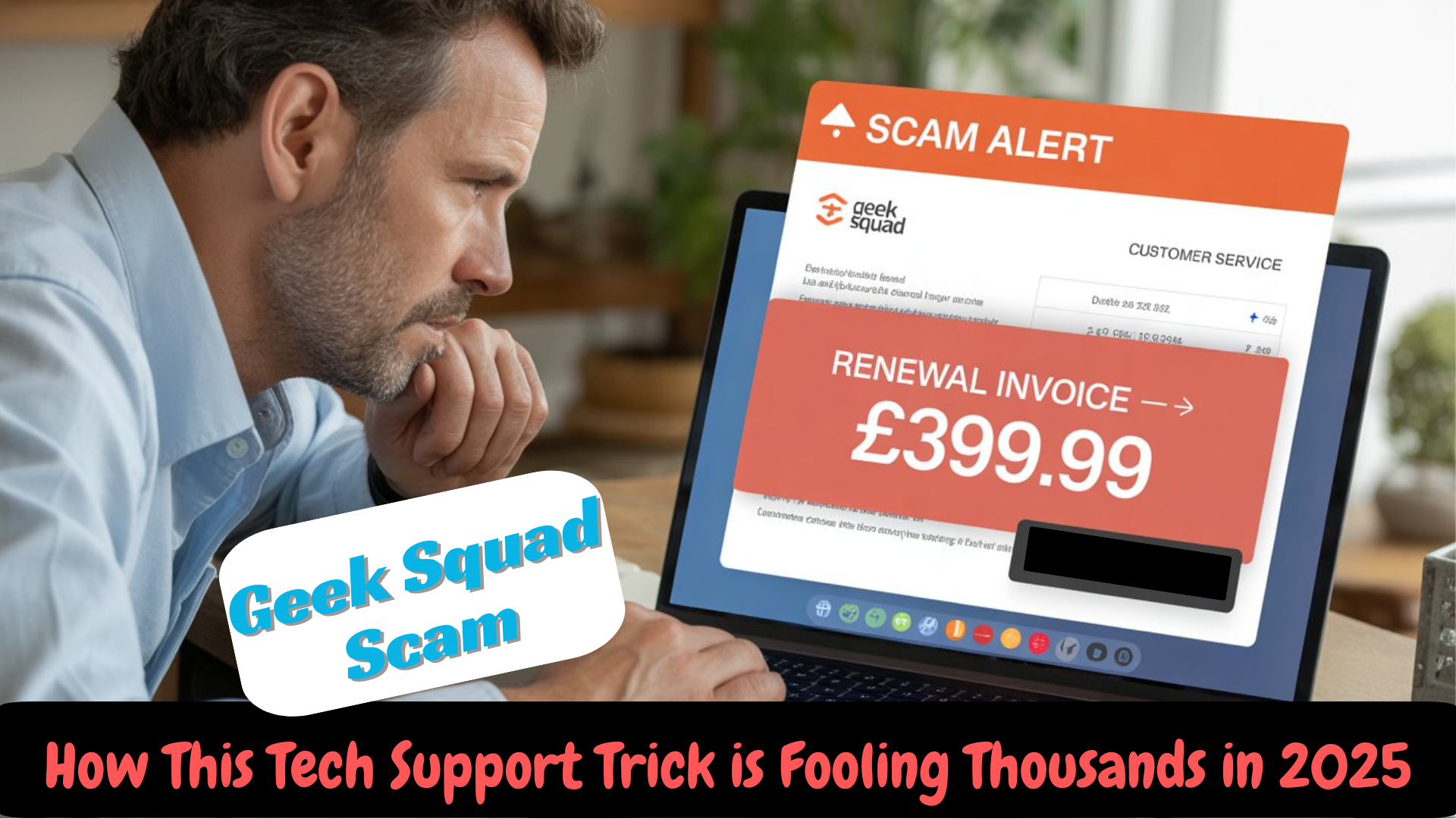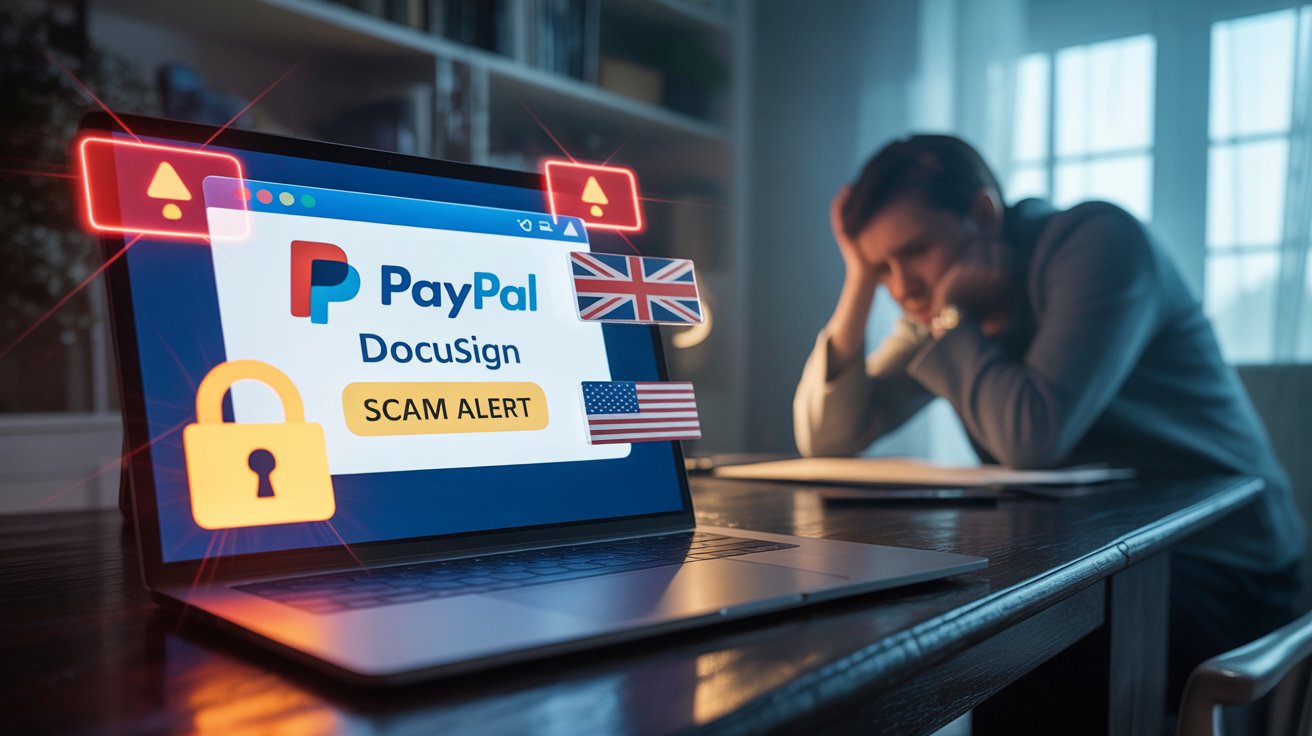The Tech Support You Never Called For
Imagine opening your inbox and finding a shocking email: “Your Geek Squad subscription has been renewed for £399.99.” The problem? You never subscribed to Geek Squad. Panic sets in. You rush to call the number provided, hoping to fix what you believe is a billing error. What you don’t realize is—you’re walking straight into a Geek Squad scam.
This isn’t a story pulled from a movie—it’s happening to thousands right now. From retirees to college students, no one is immune. In this blog, we’ll expose how the Geek Squad scam works, why it’s spreading fast, and how you can protect yourself and your loved ones from falling victim.
What Is the Geek Squad Scam?
The Geek Squad scam is a type of tech support fraud that exploits the trust people have in Best Buy’s well-known Geek Squad service. The scammers send fake emails or make phone calls claiming you’ve been charged for a subscription renewal—usually several hundred pounds or dollars. The goal? To get you to panic, call them, and hand over remote access to your device or payment details.
These scammers pretend to be from Geek Squad or Best Buy, offering to “cancel the transaction” or issue a “refund,” but they’re really after your bank information, personal data, or full control over your computer.
How the Scam Works: Step-by-Step
Here’s how the Geek Squad scam typically plays out:
1. The Fake Invoice Email
You receive an email claiming your Geek Squad membership has been auto-renewed for a large amount. It usually looks official with a fake invoice, Geek Squad logo, and customer service phone number.
Example subject line: “Your Geek Squad Plan Has Been Renewed – Order #GS8492”
2. The Panic Button
The amount (often £300–£500 or $400+) causes panic. The email urges you to call a customer support number if you wish to cancel.
3. The Scam Call
Once you call, a “support agent” calmly offers to help cancel or refund the amount. They guide you to install remote access software like AnyDesk or TeamViewer under the pretense of processing a refund.
4. The Trap is Set
After gaining access, they may pretend to send a refund but “accidentally” deposit a larger amount into your account—say $3,000 instead of $300—and beg you to send the extra back.
In reality, they never sent money. The scammer may have faked screenshots or edited your online banking interface via remote access.
5. Financial and Data Theft
Once they have your trust and device access, scammers may:
- Drain your bank account
- Steal personal data
- Install malware
- Lock you out of your own computer
Why the Geek Squad Scam Is So Effective
The success of the Geek Squad scam boils down to three powerful psychological triggers:
- Urgency: A surprise charge makes people act fast without thinking.
- Trust: The Geek Squad name is associated with real tech support, lending credibility.
- Confusion: Many victims are unsure if they ever signed up, making the scam plausible.
Scammers thrive on chaos. They create fake emergencies and offer quick solutions—at a steep cost.
Who Are the Most Common Targets?
While anyone can fall for this scam, the most targeted demographics include:
- Elderly individuals who may not be tech-savvy
- Remote workers who rely on daily tech use
- Online shoppers who might be familiar with Best Buy
- People with antivirus or tech subscriptions (making the invoice seem realistic)
A recent scam report from the UK’s National Cyber Security Centre revealed that 68% of tech support scams in 2025 began with a fake email—many mimicking Geek Squad branding.
Real-Life Case Study: John’s Costly Mistake
John, a 63-year-old retired teacher from Manchester, received an email claiming his Geek Squad subscription had been renewed for £419.99. Concerned, he called the number and spoke with a polite agent who convinced him to install remote access software.
Within 20 minutes, £2,200 had disappeared from his savings account.
“They made it feel so real. I just wanted my money back. Now I’ve lost everything,” John said.
John’s story is sadly far too common—and a stark reminder of how convincing these scammers can be.
How to Spot a Geek Squad Scam
Here are the top red flags to help you identify the Geek Squad scam:
- 🚫 You never subscribed to Geek Squad but get a renewal email.
- 📧 The email comes from a sketchy or unusual domain.
- 🧾 The invoice contains urgent language or threats.
- ☎️ A customer service number is listed instead of directing you to Best Buy’s official site.
- 🧑💻 They ask you to install remote access software.
- 💰 They request bank details or offer “accidental” refunds.
Always verify through the official website—never click on links or call numbers from suspicious emails.
How to Protect Yourself
✅ 1. Do Not Respond to Suspicious Emails
Never call the number or reply to the email. Mark it as spam or phishing.
✅ 2. Never Allow Remote Access
No legitimate tech support will ask for remote control unless you contacted them first—and even then, be cautious.
✅ 3. Use Multi-Factor Authentication
Enable 2FA on your banking and email accounts to prevent unauthorized access.
✅ 4. Install Reputable Antivirus Software
Use software that flags phishing emails and blocks malicious downloads.
✅ 5. Educate Family Members
Talk to your parents, grandparents, and children. Awareness is your best defense.
What To Do If You’ve Been Scammed
If you suspect you’ve fallen for the Geek Squad scam, act fast:
- Disconnect Internet Access – Shut down your device to block further remote activity.
- Contact Your Bank – Report the fraud and freeze accounts if necessary.
- Change Passwords Immediately – Start with email, banking, and social media.
- Scan Your Devices – Use trusted antivirus software to detect malware.
- Report to Authorities:
- UK: Action Fraud
- USA: FTC Complaint Assistant
Also report phishing emails to report@phishing.gov.uk (UK) or phishing@irs.gov (USA, for IRS-themed scams).
Why These Scams Are Rising in 2025
There’s been a sharp rise in tech support scams globally, and the Geek Squad scam is among the most persistent. Here’s why:
- 💻 More people work and shop online.
- 🎯 AI-generated emails are more convincing than ever.
- 😰 Fear and urgency tactics still work.
- 📉 Low cyber-awareness among older users.
Authorities have issued numerous warnings, but new variations pop up constantly.
Geek Squad Scam vs. Other Tech Support Scams
Let’s compare:
| Scam Type | Main Trick | Common Bait | Danger Level |
|---|---|---|---|
| Geek Squad Scam | Fake invoice email | “Renewal notice” | High |
| Microsoft Support Scam | Pop-up virus warning | “Your PC is infected!” | High |
| Amazon Support Scam | Account login issue | “Suspicious login detected” | Medium |
While the branding differs, the goal is always the same: steal your money and data.
Final Thoughts: Stay Smart, Stay Safe
The Geek Squad scam is not going away anytime soon. In fact, it’s getting more advanced every day. But you don’t have to be a cybersecurity expert to stay protected. With a little awareness, skepticism, and some basic digital hygiene, you can shut the door on these fraudsters for good.
So next time you see an invoice for a subscription you didn’t buy—pause. Take a breath. And don’t let the scammers win.
Have You Been Targeted? Share Your Story
If you or someone you know has received a Geek Squad scam email or phone call, let others know in the comments. Your story could save someone else from becoming the next victim.
Email us at help@scamfreeworld.co.uk and we’ll send it free.
Stay alert. Stay informed. Stay scam-free.
Read More Latest Scams – https://scamfreeworld.co.uk/romance-scam-uk/




